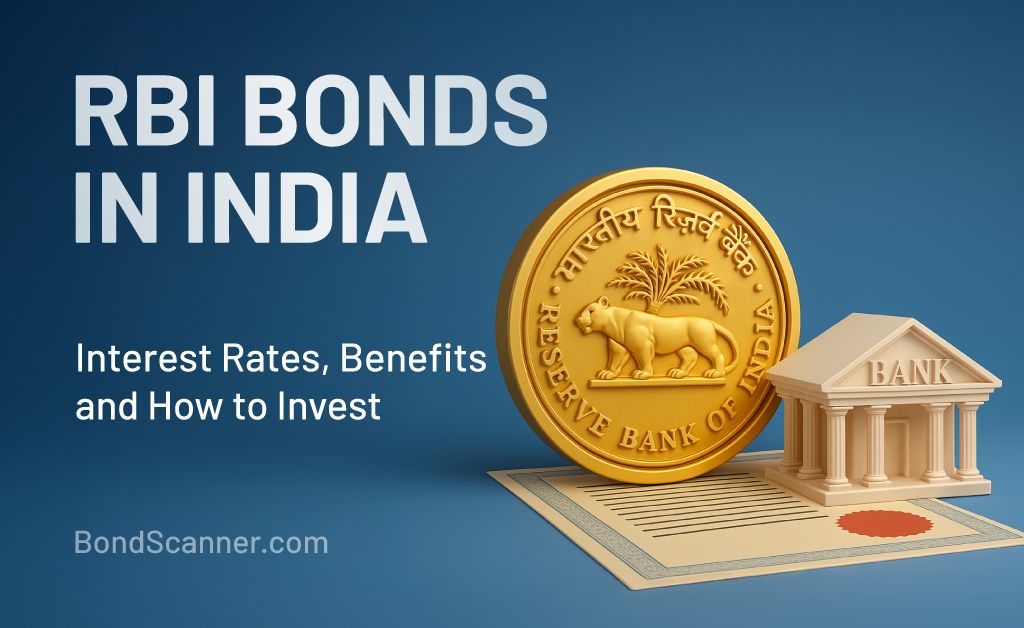RBI Bonds in India
06 October 2025

What Are RBI Bonds?
RBI Bonds are government-backed securities issued by the Reserve Bank of India on behalf of the Government of India. These bonds provide investors with a secure avenue for fixed-income returns, carrying minimal default risk. They are considered suitable for risk-averse investors, including senior citizens and long-term savers.
This guide provides an overview of RBI bonds, their types, features, interest rates, and how investors can participate, aiming to educate rather than advise on investment decisions.
RBI Bonds are debt instruments issued to raise funds for government-backed initiatives. They offer fixed returns to investors and are considered among the safest investment options due to sovereign backing.
Some key RBI bond schemes include:
Floating Rate Savings Bonds (FRSBs), 2020 (Taxable): Interest is linked to the National Savings Certificate (NSC) rate plus a spread, payable every six months, with a tenure of 7 years.
Sovereign Gold Bonds (SGBs): Denominated in grams of gold, these bonds provide fixed interest (currently 2.5% per annum) plus potential capital gains linked to gold prices. They can be redeemed at maturity or traded on exchanges.
RBI Bonds Interest Rates
Interest rates for RBI bonds vary by type:
Floating Rate Savings Bonds (FRSBs): Interest rates are revised every six months according to the NSC rate, keeping returns aligned with prevailing small savings rates.
Sovereign Gold Bonds (SGBs): Fixed annual interest of 2.5% plus potential gains from gold price appreciation.
Investors can refer to the RBI website or authorized bank portals for the latest interest rate updates.
How to Buy RBI Bonds
Investors can purchase RBI bonds through the following channels:
Authorized Banks: Banks like SBI, HDFC, and ICICI facilitate bond applications.
RBI Retail Direct Portal: Government-backed online platform to buy RBI bonds directly.
Post Offices: Certain RBI bond schemes are available at designated post offices.
Steps to Buy Online:
Register on the RBI Retail Direct portal or your bank’s official website.
Complete KYC verification.
Select the desired bond (FRSB or SGB).
Make the payment online.
Bonds are credited to your Demat account or issued as a holding certificate.
RBI Bonds for Senior Citizens
RBI bonds are popular among senior citizens due to:
Safety of Investment: Backed by the Government of India.
Assured Interest Payouts: Regular interest every six months.
Alternative to Fixed Deposits: Offers stability amid fluctuating FD rates.
Senior citizens can apply through banks or online platforms using simplified procedures.
RBI Bonds for NRIs
Floating Rate Savings Bonds: NRIs are not eligible.
Sovereign Gold Bonds: NRIs may hold SGBs acquired while they were resident Indians. Redemption rules may vary, so investors should refer to RBI notifications.
Key Features of RBI Bonds
Tenure: 7 years for FRSBs, 8 years for SGBs.
Lock-in Period: No premature withdrawal except in certain cases for senior citizens.
Interest Payment: Semi-annual payouts credited to bank accounts.
Taxability: Interest is taxable as per income tax laws. No tax-free bonds are currently offered.
Collateral Use: Bonds can be used as collateral for loans from banks.
RBI Bonds Outlook 2025
RBI bonds are expected to continue playing a vital role as safe and stable investment instruments. Floating Rate Bonds align returns with small savings rates, while Sovereign Gold Bonds offer a potential hedge against inflation and currency fluctuations. They remain suitable for investors seeking government-backed security in 2025 and beyond.
Conclusion
RBI bonds are among the safest investment options in India, offering stable returns, semi-annual income, and opportunities to invest in gold without physical ownership. They are particularly suitable for senior citizens and risk-averse investors seeking government-backed instruments.
At Bonds Scanner, we provide educational insights into RBI bonds and other fixed-income securities to help investors make informed decisions.
FAQs on RBI Bonds
Q1. What are RBI bonds?
RBI bonds are debt instruments issued by the Reserve Bank of India, providing fixed-income investment options with sovereign backing.
Q2. What is the current RBI bonds interest rate?
Floating Rate Savings Bonds have interest linked to the NSC rate, revised semi-annually. Sovereign Gold Bonds offer 2.5% annual interest plus potential gains from gold price appreciation.
Q3. How to buy RBI bonds online?
Bonds can be purchased via RBI Retail Direct portal or through authorized banks.
Q4. Are RBI bonds suitable for senior citizens?
Yes, they offer assured income and sovereign security, making them appropriate for senior citizens.
Q5. Can NRIs invest in RBI bonds?
NRIs cannot invest in FRSBs but may hold SGBs acquired while resident in India.
Disclaimer
This blog is intended solely for educational and informational purposes. The bonds and securities mentioned herein are illustrative examples and should not be construed as investment advice or personal recommendations. BondScanner, as a SEBI-registered Online Bond Platform Provider (OBPP), does not provide personalized investment advice through this content.
Readers are advised to independently evaluate investment options and seek professional guidance before making financial decisions. Investments in bonds and other securities are subject to market risks, including the possible loss of principal. Please read all offer documents and risk disclosures carefully before investing.
Recent Blogs

GPF Full Form: Understanding General Provident Fund and Its Role in Salary
A detailed guide explaining the GPF full form in salary, its benefits, working mechanism, and how it functions for employees in India.
20 Feb 2026

Difference Between Loan and Debenture: Understanding Key Financial Concepts
Explore the key differences between loans and debentures, their characteristics, benefits, and how each works in corporate finance.
20 Feb 2026

AMO Order Explained: What It Is, Charges, Timing & How to Place an AMO Order in Zerodha
Learn about AMO (After Market Orders), how they work, charges, validity, and how to place AMO orders in Zerodha, along with key differences from pre-market orders.
19 Feb 2026